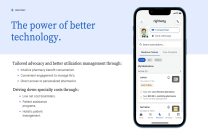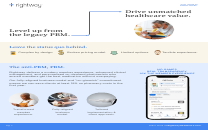
Rightway
Founded Year
2017Stage
Series D | AliveTotal Raised
$238.75MLast Raised
$108.75M | 7 mos agoMosaic Score The Mosaic Score is an algorithm that measures the overall financial health and market potential of private companies.
-12 points in the past 30 days
About Rightway
Rightway is a technology and services company focused on the healthcare experience within the healthcare sector. The company offers a platform that streamlines healthcare processes for clients and members, making it more accessible and manageable. It was founded in 2017 and is based in New York, New York.
Loading...
Rightway's Product Videos


Rightway's Products & Differentiators
Rightway Care Navigation
Rightway’s care navigation solution dramatically improves employee healthcare by conquering the major issues caused by healthcare complexity. Every member is paired with a live, clinical guide who provides on-demand, tailored support throughout their care journey. The user-friendly app and team of live, empathetic health guides act as a single point of contact to the healthcare system, delivering benefits education, steerage to high-quality providers, and billing accuracy. This personalized, “doctor in the family” approach drastically improves the member experience, ensuring that members get the highest-quality care at the best price while eliminating wasteful and preventable spend.
Loading...
Research containing Rightway
Get data-driven expert analysis from the CB Insights Intelligence Unit.
CB Insights Intelligence Analysts have mentioned Rightway in 1 CB Insights research brief, most recently on Oct 14, 2022.
Expert Collections containing Rightway
Expert Collections are analyst-curated lists that highlight the companies you need to know in the most important technology spaces.
Rightway is included in 3 Expert Collections, including Unicorns- Billion Dollar Startups.
Unicorns- Billion Dollar Startups
1,249 items
Digital Health
11,109 items
The digital health collection includes vendors developing software, platforms, sensor & robotic hardware, health data infrastructure, and tech-enabled services in healthcare. The list excludes pureplay pharma/biopharma, sequencing instruments, gene editing, and assistive tech.
Digital Health 50
150 items
The winners of the third annual CB Insights Digital Health 150.
Latest Rightway News
Oct 4, 2024
Rightway You probably have no idea who your pharmacy benefits manager (PBM) is. But you almost definitely have one. A pharmacy benefits manager is what it sounds like: PBMs manage prescription drug benefits, which involves coordinating across a laundry list of stakeholders—that includes health insurers, employers, pharmacies, customers, and more. Roughly 275 million Americans have a PBM, more than 80% of the U.S. population. Those basic facts in place, I don’t know what I expected, but it wasn’t this: In 2023, about 80% of all prescription drug claims in the U.S. were processed by only three companies. Those three companies are all attached to healthcare monoliths: Cigna’s Express Scripts, UnitedHealth’s OptumRx, and CVS Caremark. CVS made headlines earlier this week, as the giant is reportedly exploring a potentially sprawling breakup. Jordan Feldman, CEO and cofounder of VC-backed PBM Rightway, believes the news could have downstream effects for millions. And he didn’t mince words. “CVS is a failed healthcare vertical integration,” he said via email. “Across the board, whether it be Medicare advantage or pharmacy benefits they are ineffective. So all they can do at this point is try and extract maximum profitability on PBM, to try and appease shareholders. This will come at the expense of employers and employees.” Then again, Feldman isn’t a words-mincing-kinda-guy. He cofounded Rightway in 2017, expressly looking to reimagine the space. The PBM portion of Rightway’s business was incubated with Thrive Capital in 2019, looking to build a serious competitor to the largest PBMs. Today, two million people have access to Rightway through their employers. Feldman says the timing is starting to look right for an industry shake-up. “Pharmacy benefits has arrived,” he told Fortune. “It’s come onto the radar. It’s become a meaningful part of overall healthcare spend, and as we pull back the curtain on it, there are some enormous flaws, misaligned incentives, and challenges with the current ecosystem.” Few topics generate as much heat as pricing in healthcare, and prescription drug prices are no exception—between 2006 and 2020, prices for hundreds of the most common prescriptions increased fast enough to outpace general inflation, according to an AARP report from this year . In that time, pharmacy benefits have gained importance, growing from “a single-digit [and] small-percent of total healthcare spend, to 30% or 40% of healthcare spend in some cases,” said Feldman. But it’s not just about pricing. After years behind-the-scenes, concerns about concentration in the PBM space have grown increasingly public. And it’s been quite the pile-on. This summer, the House Oversight Committee held a hearing on PBMs, with an investigation concluding that the largest PBMs “play an oversized role in the pharmaceutical supply chain and push deliberate pricing tactics to line their own pockets.” Almost simultaneously, four former Wells Fargo employees sued the bank for mishandling its employer-offered health insurance plan, with the lawsuit putting large PBMs right in the crosshairs. Then, in September, the FTC sued the three big PBMs, alleging “anticompetitive and unfair rebating practices.” In all this, Feldman and Thrive partner Kareem Zaki believe we’re in early innings of a shift in the industry—and, despite the few entrenched players, there’s a chance to really make a difference in the marketplace. “I think this is the first time it’s actually happening to consumers,” said Zaki. “Consumers are frustrated when they show up and the drugs are expensive, and prices shouldn’t be this high.” Feldman and Zaki seem far from alone in this view. Rightway’s other backers include Khosla Ventures and Tiger Global, and the company was valued at $1.1 billion in 2021 (Rightway declined to disclose its latest valuation.) Per Crunchbase, the company has raised about $238 million to date. There are also a number of other venture-backed or tech-adjacent PBMs out there: SmithRx is backed by Founders Fund and Venrock, and there’s Mark Cuban’s buzzy Cost Plus Drugs . “When you see a market dominated by three people, that’s too expensive, and that no one likes, it feels like there’s something to go after,” said Zaki. “But in the same way that it’s so dominant, big, and important, it’s also not easy to disrupt something like that.” The word “oligopoly” comes up when I talk to both Zaki and Feldman, and it’s a term that both CVS and the Pharmaceutical Care Management Association naturally object to. The PCMA said via email that “the market is competitive and diverse, with more than 70 full-service PBMs of varying size operating across the country.” “Anyone calling the PBM space an ‘oligopoly’ simply doesn’t understand how pharmacy benefits work,” said CVS Caremark spokesperson Phillip Bland in a statement. “With so much competition,” he added, “CVS Caremark has to earn our clients’ trust every day based on the service and value we provide.” Indeed, there are at least 70 U.S. PBMs operating, a point that Aon SVP and national pharmacy practice leader Tracy Spencer also made to me. I asked her if she thinks hopeful disruptors have a shot. “I don’t think it’s a futile fight,” said Spencer. “Disruptors have driven change in this marketplace for as long as I’ve been doing this… These disruptive players do have the ability to change the environment… Oftentimes, the market has to see some proof points with these organizations before they’ll start to take off.” Rightway’s corporate customers include Tyson, eBay, and Qualtrics. I spoke to one Rightway customer, a human, not a company. She’s had a good experience with Rightway so far, after switching from her previous Big Three provider nearly a year ago. She’d probably tell me “good experience” is an understatement. “I know this sounds so goofy, but it’s changed my life as far as time goes,” she said, speaking on the condition of anonymity because we discussed her health. “I’m not having to do all this legwork for prescriptions anymore. That’s a big deal to me.” It’s in Rightway’s interest to put me in touch with a happy customer, yes. But her enthusiasm was undeniable—as was her relief. Talking to her drove home a reality that transcends Rightway or any of the other PBMs: I’m very lucky that I don’t have to know my PBM. Many Americans have no choice, because they or their loved ones have a health condition that means they have no choice but to know. Perhaps this is a sector where venture can truly do what it does best—back the upstart. And Feldman, in characteristic fashion, isn’t mincing words. “It’s going to take a village to unseat an oligopoly,” he said. “And one of the things I take most pride and joy in is rallying a village.” See you tomorrow,
Rightway Frequently Asked Questions (FAQ)
When was Rightway founded?
Rightway was founded in 2017.
Where is Rightway's headquarters?
Rightway's headquarters is located at 422 West Broadway, New York.
What is Rightway's latest funding round?
Rightway's latest funding round is Series D.
How much did Rightway raise?
Rightway raised a total of $238.75M.
Who are the investors of Rightway?
Investors of Rightway include Thrive Capital, Khosla Ventures, Tiger Global Management and Jonathan Locker.
Who are Rightway's competitors?
Competitors of Rightway include Eden Health and 5 more.
What products does Rightway offer?
Rightway's products include Rightway Care Navigation and 1 more.
Loading...
Compare Rightway to Competitors

Transcarent is a health and care experience company that operates within the healthcare sector. It offers a platform that simplifies access to healthcare services through a personalized app and an on-demand care team, aiming to provide high-quality, affordable, and appropriate care. The company primarily serves employers and consultants, providing a comprehensive healthcare solution that integrates with existing benefits programs. It was founded in 2020 and is based in Denver, Colorado.

Amino focuses on healthcare navigation through its digital platform within the healthcare industry. Its main offerings include a healthcare navigation platform that provides data-driven care recommendations and integrates employer-sponsored health benefits to guide members. Amino primarily serves self-insured employers, health plans, third-party administrators, brokers, and human resources (HR) technology providers. It was founded in 2013 and is based in San Francisco, California.

Quantum Health operates as a consumer healthcare navigation company in the healthcare industry. The company offers services to guide consumers and their providers through their healthcare journey, aiming to simplify the process and reduce costs. Their primary market includes employers seeking to improve healthcare outcomes and cost savings. It was founded in 1999 and is based in Columbus, Ohio.

Healthee focuses on simplifying health benefits management through its AI-powered healthcare platform. The company offers a virtual assistant that provides personalized answers to coverage and treatment questions, streamlines Open Enrollment, and suggests preventive care. Healthee was formerly known as Insurights. It was founded in 2021 and is based in New York, New York.

Maven serves as a virtual clinic that specializes in women's and family health within the healthcare sector. The clinic offers continuous, holistic care services, including fertility and family building, maternity, parenting, pediatrics, and menopause management. Maven primarily serves employers and health plans, aiming to improve health outcomes and reduce healthcare costs. It was founded in 2014 and is based in New York, New York.

Included Health operates as a healthcare company. The company provides a range of services, including guidance on healthcare benefits and insurance, virtual primary and urgent care, behavioral health services, and specialist-matched expertise for new diagnoses. It primarily caters to employers, health plans, consultants, and labor and trust members. It was formerly known as Grand Rounds Health. It was founded in 2011 and is based in San Francisco, California.
Loading...
